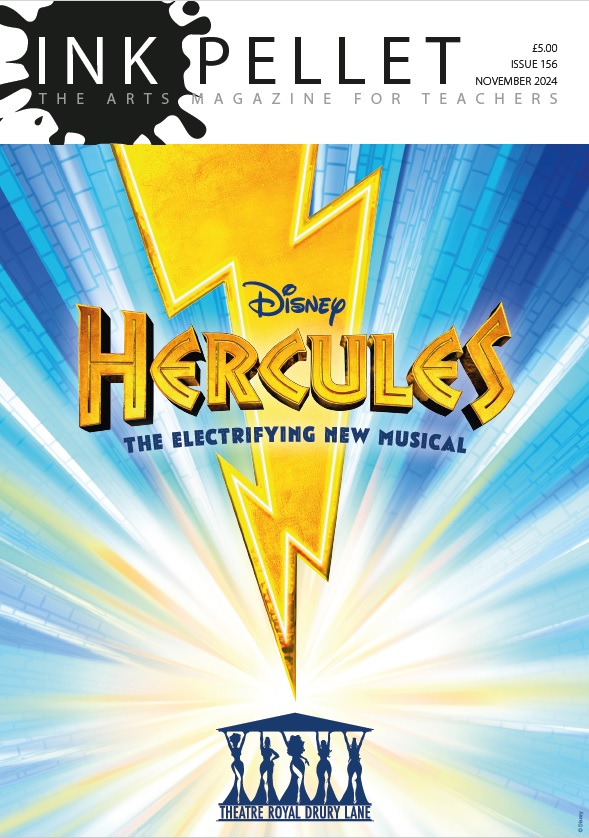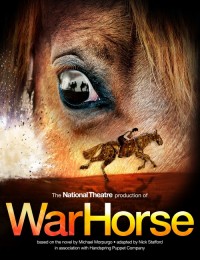Now in its sixth year in London, the War Horse stage show goes on the road; giving a wider audience the chance to see Michael Morpurgo’s story come alive and to take part in workshops and events that offer an authentic insight into theatre-making at the very highest level. The National Theatre’s learning Programme manager Melanie Whitehead told LESLEY FINLAY about what audiences can expect…
Sometimes stories touch the heart of a nation. Michael Morpurgo’s War Horse is one of them. Of course, we fell in love with Joey the war horse through the beautifully-written pages of his moving novel. But it has been more than helped on its way by the stage show, developed by the national theatre in a collaboration with the Handspring Puppet Company – an awesome example of artistry and theatre-making which has developed our perception and understanding of the First World War.
The stage show is now on national tour, along with the education programme that will be replicated on tour. Melanie Whitehead is the learning programme manager for the War Horse UK and Ireland tour, working with partners that include the tour theatres, teachers and museums to offer enriching experiences for students. She says: ‘We’re working very much in partnership with the venues; developing programmes that their local schools, families and groups will be interested in. it’s using the skills of these local practitioners and balancing this with what we’re going to deliver as the national theatre.
‘It’s an opportunity to see inside that process of theatre making from the national theatre’s perspective. There are elements of our London Page to stage workshop but this will be slightly different on tour. The event runs for an hour and a half and is specifically designed to look at War Horse as a show.
‘It has extraordinary creative learning opportunities. We have members of the company who have gone through the rehearsal process and grappled with what it takes to put War Horse on stage – like puppetry, the actors’ process, design and much more. We explore those elements in a pre-show activity that is interactive. Young people have a chance to get up and get their hands dirty! We’re trying to limit the numbers to about 400 in the tour venues to give a relatively intimate experience so everyone feels they are getting a taste of that activity.’
If you have ever witnessed English or Drama students (or young theatre-goers for that matter) ‘let loose’ to quiz professionals, then you will know they take that opportunity with an energy, intensity and intelligence that is inspiring. The sessions work both ways, benefiting the actors too.
Melanie says: ‘We have a huge number of GSCE English and Drama students who ask a wide range of questions from ‘how do you get to be a puppeteer?’ through to ‘what did you do at this point of the production?’ and they get to hear it from the horse’s mouth – if you’ll pardon the pun!
‘Having run this kind of event it’s amazing what the impact of the event is on the performers and the insight they get from the audience. Sometimes the questions they ask help them to look at the performance in new ways. Some actors have had a kind of epiphany after an event, which has made them think about their performance, enabling them to keep it fresh. It’s a reciprocal thing.
‘These sessions are absolutely matched to the rehearsal process – they’re not something we’ve plucked out of the air – and demonstrate how those actors, designers and directors have put that show together.’
The puppetry workshops are of course much sought-after and will also be available in tour venues. Melanie says: ‘These workshops are delivered by puppeteers who have been in the show – performed at the National Theatre, the New London Theatre or even internationally – and who know what it feels like to be Joey’s heart, head or hind. The workshops offer an authentic narrative from the National Theatre rehearsal room, sharing the same process the actors did when they were learning how to be a war horse puppet, getting people to have a deeper understanding and engagement with the horses on stage. We’re working with theatres to offer this to local schools before or after the show or even with a group of people with a specific interest, as a stand-alone workshop. The detail is in the booking process.’
Venues are also developing their own activities – for example The Lowry in Salford, which has a very strong visual arts link, is offering War Horse themed visual arts and design workshops; as well as family events and Arts Award.
Finally, teachers are included too. Melanie adds: ‘We hope to offer professional development for teachers and are developing the website to link with the tour [it should be live as you read]. We’re also producing new resources and workshops for teachers which will include history, puppetry, as well as suggestions for learning activities.’
Further information War Horse on tour Plymouth (Sept 27-Oct 12); Birmingham (Oct 16-Nov 9); Salford (Nov 20-Jan 18); Edinburgh (Jan 22-Feb 15); Southampton (Feb 19-Mar 15); Dublin (Mar 26-Apr 26); Sunderland (Apr 30-May 17); Bradford (May 26-June 14); Cardiff (June 18-July 19).
The National Army Museum (NAM) WW1 Handling Session Developed with the National Theatre, this new, free two-hour session, uses the museum’s archives and handling collection to explore the history behind the story of War horse. NAM education officers visit schools and spend time with a class or year group who have been or will be audience members of the NT’s production of War Horse. This could be a Drama, English or history-focussed group. The aim of the workshop will be to enrich the students’ understanding of the 1914-18 war from an historical perspective, exploring the true stories of soldiers and horses that fought and died on the Western front. NAM practitioners will be in the following areas: Plymouth (Sept 30-Oct 5); Birmingham (Oct 21-26); Salford (Nov 25-30, and Jan 13-19); Edinburgh (Jan 27-Feb 1); (Feb 24-Mar 1); Sunderland (May 5-10); Bradford (June 2-7) and Cardiff (June 23-28, July 7-12). To find out more ask participating theatres.
The West End show continue at the new London theatre with booking up to February 2014.
Inside the Horse, an intermittent workshop, led on the day ink Pellet visited, by the engaging Jimmy grimes. Like an alchemist, he and his fellow puppeteers turned sculpted wood and plastic into living breathing horses. Not only does it give an insight into the actor’s art – it gives you an insight into the equine disposition and behaviours. Book through the website.
More information and education packs are available from www.warhorseonstage.com



